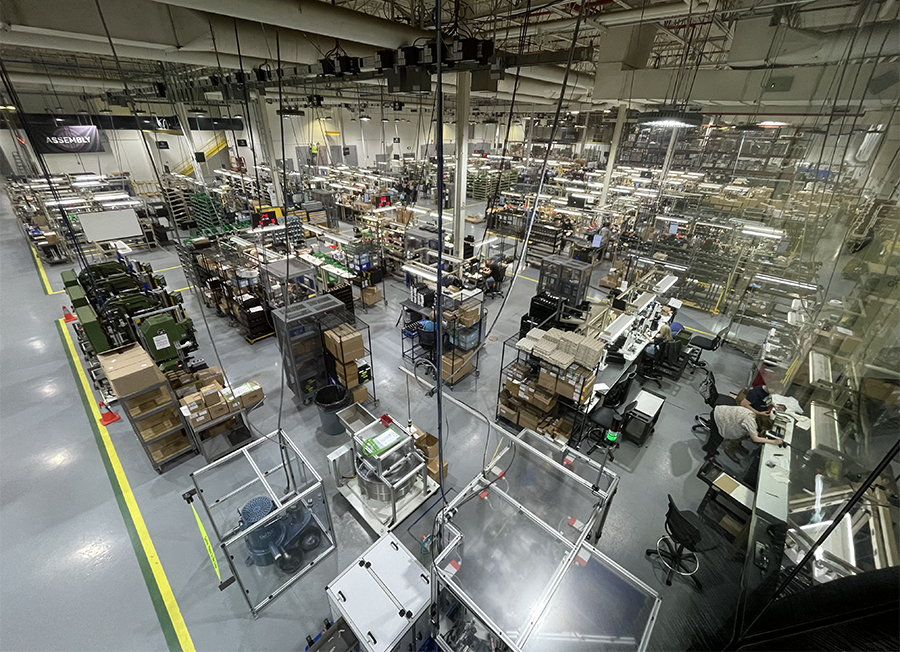
Speed kills is a common phrase any motorist will have seen at some point driving across the U.S. interstate highway system. It’s a warning, but it’s also an admonition. For what, you ask? To go faster.
The first time I heard it used that way was on a campaign. In the political campaign world, going fast, responding fast, acting fast is how you kill your opponent’s momentum. It’s a necessity in politics because your ability to respond quickly is what keeps you ahead in the polls or at least keeps you from falling back any further.
That’s why campaigns have rapid response teams. It’s a powerful tool, but not just for campaigns.
As we work our way into Q2-25 the firearms industry is seeing not just the predicted and expected slowdown to the normal sales volumes we had grown accustomed to in the mid 2010s, but also the volatile market fluctuations of on-again, off-again tariffs.
Where you stand on tariffs is irrelevant at the moment. The immediate concern is how we respond to them. For consumers it’s easy. We either buy now before prices go up or hold our money and wait it out. Coming off the high inflation years of the Biden administration, holding onto your money might be a wise choice, at least until a little more clarity comes to the market.
For companies, it’s a whole other battle, one where speed is essential.
Facing a slowing or stagnant economy where consumers are loathe to part with their disposable income, companies need to find ways to entice customer spending. For many that means discounting, rebates, or value-added promotions. For larger companies with experience weathering times like these, it means bringing new products to market that have been in development.
That’s a decidedly difficult feat to pull off since new products take time, and the development process limits how fast you can move. The new products we see this year — and we will see them — are the result of early preparation for this time in our economy.
But for those companies that rely on imported firearms or components, the cost increases of the Trump administration’s tariffs will cause major headaches. And if those companies aren’t prepared to pivot to U.S. manufacturing alternatives and suppliers, those headaches could last a while.
An unfortunate aspect of the newly-imposed tariffs is that we don’t know how long they will last. Trump’s approach to tariffs is two-pronged. First, it supports the U.S. manufacturing industrial base by forcing foreign markets to open up to our products by removing tariff barriers.
Second, it forces – though Trump might say ‘encourages’ – U.S. companies to re-shore production of their products here in at home. We’ve seen some indication that large international companies are planning to bring at least some of their manufacturing back to the U.S. Apple plans to spend $500 billion over the next four years in support of U.S. manufacturing. Though don’t expect iPhones, iPads and MacBooks to be manufactured in the U.S. any time soon. That’s a much longer transition which Apple hasn’t committed to.
Here in Arizona, just across the road from the Ben Avery Shooting Facility, you can see the massive TSMC facility where the Taiwan Semiconductor Manufacturing Company is bringing their advanced chipmaking to the U.S. This wasn’t done out of concern about tariffs, but out of the real fear of an invasion of Taiwan by China.
On a much smaller scale, but one important within our industry, we see companies that import also sourcing from U.S. vendors. This weekend, James Sellers, founder and CEO of Sellmark Corporation, addressed this very issue in an open letter posted at LinkedIn. In it, he outlined how Sellmark has been preparing and “proactively shifted sourcing, developed redundancy, and enhanced domestic capabilities.”
The high tariffs that remain on China will hurt Sellmark, but not as much had they not been moving to mitigate such problems. This is where companies need to adopt the ‘speed kills’ manta and find their way to greater agility and flexibility to confront market hurdles. The days of coasting on legacy products and simple line extensions are long gone for most companies. At least the companies that are focused on growth.
Those companies that have dragged their feet on engaging U.S. vendors and building redundancy in their supply chain now have little choice but to seriously focus on this initiative.
The economic turmoil we face this year leaves manufacturers in the firearms, optics, archery, and accessories industry with no other option than to move now and move fast. And the faster they do that, the faster they’ll find a clearer path through the turmoil.


I hope President Trump will fire the government workers responsible, for termination of civilian sales of ammunition. From government run ammo plants.
It was The brain dead Biden who stopped ammo sales to civilians, a few years ago. And that is one reason why ammo prices went up.
“I hope President Trump will fire the government workers responsible, for termination of civilian sales of ammunition“
Yeah, Trump has been in office for three months and he hasn’t done a thing to end the ban…
That’s because there never was a ‘Biden ban’ on ammunition sales from Lake City, that was just right wing propaganda that fooled you and many other MAGA folks.
“In this case, the rumor is false. Lake City has NOT been ordered to stop production of commercial ammunition. Lake City has NOT canceled their commercial contracts or stopped sales. Why are prices on certain calibers suddenly up? Because people are panic buying and there’s money to be made. If you look back prior to the attack on Israel and the Lake City rumor, prices on firearms and ammunition were down and warehouses were full. Sales had not only slowed but were becoming stagnant in the firearms industry.“
https://www.firearmsnews.com/editorial/lake-city-false-rumors/485050
Yep, once again you were snookered by a slick NYC con artist and his cronies, milking profits from the gullible.
actually Lake City did terminate commercial sales of Ammo. They just didn’t cancel the commercial contracts or change their commercial distribution policies and they were not ordered to stop production of commercial ammunition. But that’ until you discover the context
How it happened: Biden admin directed all their ammo production to be directed to ‘government/military’ (and a lot went to Ukraine) – here’s the thing, when the facility is able to produce more ammo than the government requires, they sell it either to consumers or distributors in the commercial market – it doesn’t actually produce ammo specifically for the civilian commercial market but rather for the government and what goes to the commercial market is ammo the government doesn’t take for their requirements. But Biden ordered that ALL of their ammo go to ‘government/military’ thus there was no ammo more than what the government required. So in effect, due to Biden admin actions, there was a de facto ban on sales of Lake City ammo to the commercial market.
I got this from the Lake City folks right at the factory. My brother and I went to pick up a lot of ammo, 50,000 rounds, we had purchased as one of their ‘preferred buyers’. When we arrived we were told this was going to be the last we could buy for a while from Lake City because of Bidens actions (see above). At first when this news came out we were concerned that we would not be able to pick up the ammo we had already paid, but called our contact and he said our ammo wasn’t affected so we went to get it and bought it home.
so in reality ‘Chris T in KY’ was correct as “It was The brain dead Biden who stopped ammo sales to civilians, a few years ago. And that is one reason why ammo prices went up.”
and as for the other thing ‘Chris T in KY’ posted: “I hope President Trump will fire the government workers responsible, for termination of civilian sales of ammunition“
We already did that, we voted Biden out of office – we fired him.
so it didn’t last long though. They ramped up production, and to keep their workers employed they started selling into the commercial market again because they were able to exceed what the government was giving them in requirement after some ‘negotiation to get away from ALL ammo to government’. And the reason for that is, actually, the LC production can’t exist for long on making ammo just for the government as what the government pays for ammo is not enough to sustain the plant and workers (without a declared war, in which case the workers would be paid as though actual government employees and the government would keep the plant open). Commercial sales of their ammo is needed to keep the plant operating and workers paid and employed. This is why the contract stipulates that anything over government requirement can be sold into the commercial market by the commercial company operating the plant. But it did last long enough to raise the price on ammo and create some commercial market shortage of LC ammo – although, they were not really responsible for the overall shortage across the board as that was caused by very large quantity buyers in response to the times.